H-Shares vs. A-Shares: What Are They, and How Do They Differ?
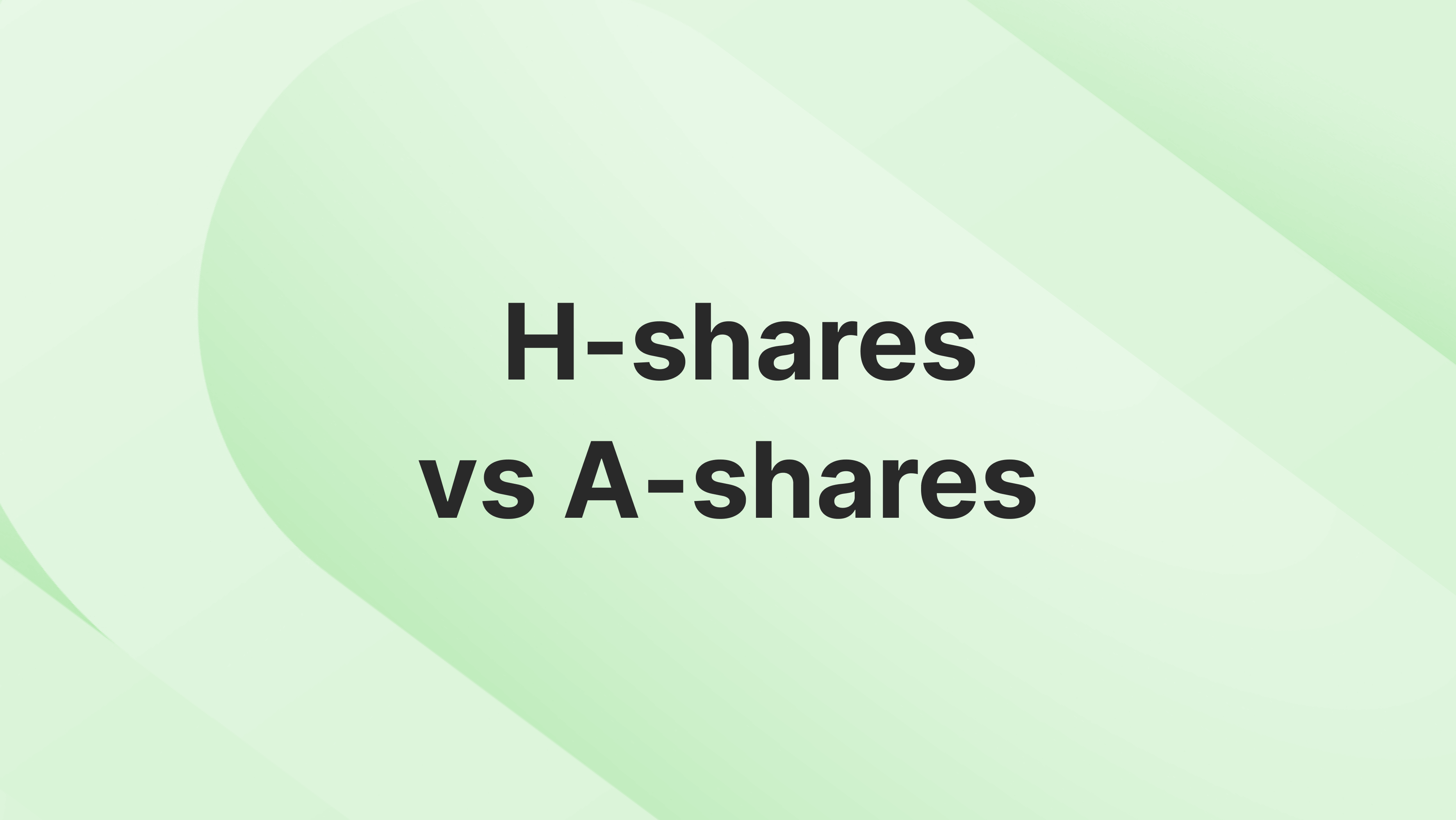
 By Constantine Belov
By Constantine BelovAs a hard-working, goal-oriented, and well-rounded person, I always strive to do quality work for every job I do. Faced with challenging tasks in life, I have developed the habit of thinking rationally and creatively to solve problems, which not only helps me develop as a person, but also as a professional.
Speaking about my professional activities, I can say that I have always been attracted to the study of foreign languages, which later led me to the study of translation and linguistics. Having great experience as a translator in Russian, English and Spanish, as well as good knowledge in marketing and economy, I successfully mastered the art of copywriting, which became a solid foundation for writing articles in the spheres of Fintech, Financial markets and crypto.
 By Tamta Suladze
By Tamta SuladzeTamta is a content writer based in Georgia with five years of experience covering global financial and crypto markets for news outlets, blockchain companies, and crypto businesses. With a background in higher education and a personal interest in crypto investing, she specializes in breaking down complex concepts into easy-to-understand information for new crypto investors. Tamta's writing is both professional and relatable, ensuring her readers gain valuable insight and knowledge.

Investing in Chinese businesses presents significant potential benefits, yet it is essential to understand the various categories of shares to make informed choices. Among these, H-shares and A-shares are two primary types that signify ownership in Chinese enterprises. However, they vary considerably in terms of their trading venues, the eligibility of investors, and the regulatory frameworks governing them.
A-shares are offered on mainland Chinese exchanges such as the Shanghai Stock Exchange (SSE) and the Shenzhen Stock Exchange (SZSE), and they are primarily traded in Chinese yuan by domestic investors, with limited access for foreigners. In contrast, H-shares are traded on the Hong Kong Stock Exchange in Hong Kong dollars, offering easier access to globe-trotting investors.
This post will explain to you what H-shares and A-shares are, the difference between them, and the current developments and trends in their regulation.
H-shares are stocks of Chinese corporations listed on the Hong Kong Stock Exchange, where they are quoted and traded in Hong Kong dollars (HKD).
A-shares, on the other hand, represent businesses that are headquartered in mainland China valued on the Shanghai or Shenzhen stock exchanges and traded in Chinese yuan.
With H-shares from over 300 Chinese firms, investors can gain broad exposure to a wide range of industries within China through an internationally accessible platform.
A-shares refer to stocks of China H shares listed on the mainland Chinese stock exchanges, specifically the Shanghai Stock Exchange and the Shenzhen Stock Exchange. These shares are denominated in Chinese yuan and are primarily available for trading by domestic investors.
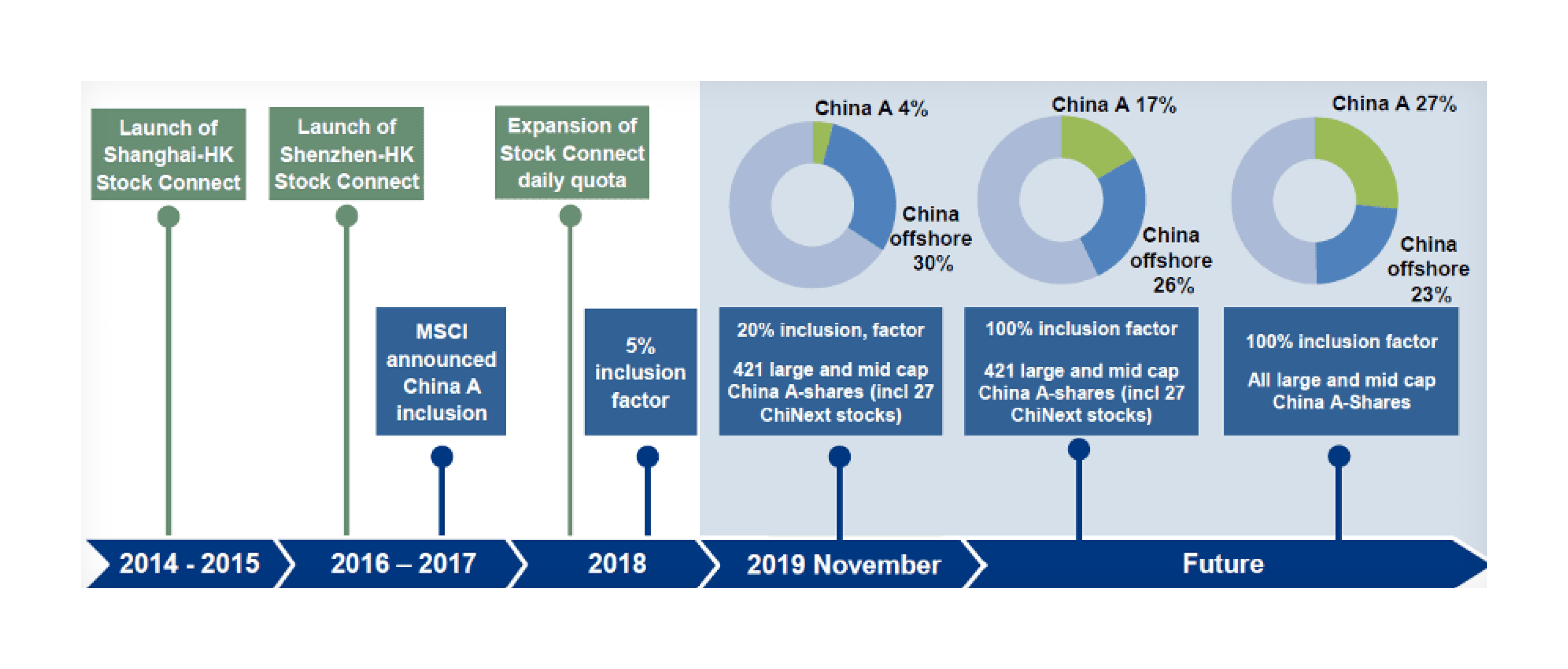
Historically, A-shares were restricted to Chinese mainland investors due to regulatory policies, but over time, certain programs have allowed qualified foreign investors to participate.
The Qualified Foreign Institutional Investor (QFII) program and the Renminbi Qualified Foreign Institutional Investor (RQFII) program have given institutional investors access to A-shares.
The Stock Connect programs — such as the Shanghai-Hong Kong Stock Connect and Shenzhen-Hong Kong Stock Connect—have further opened the A-Share market to international investors, improving cross-border access.
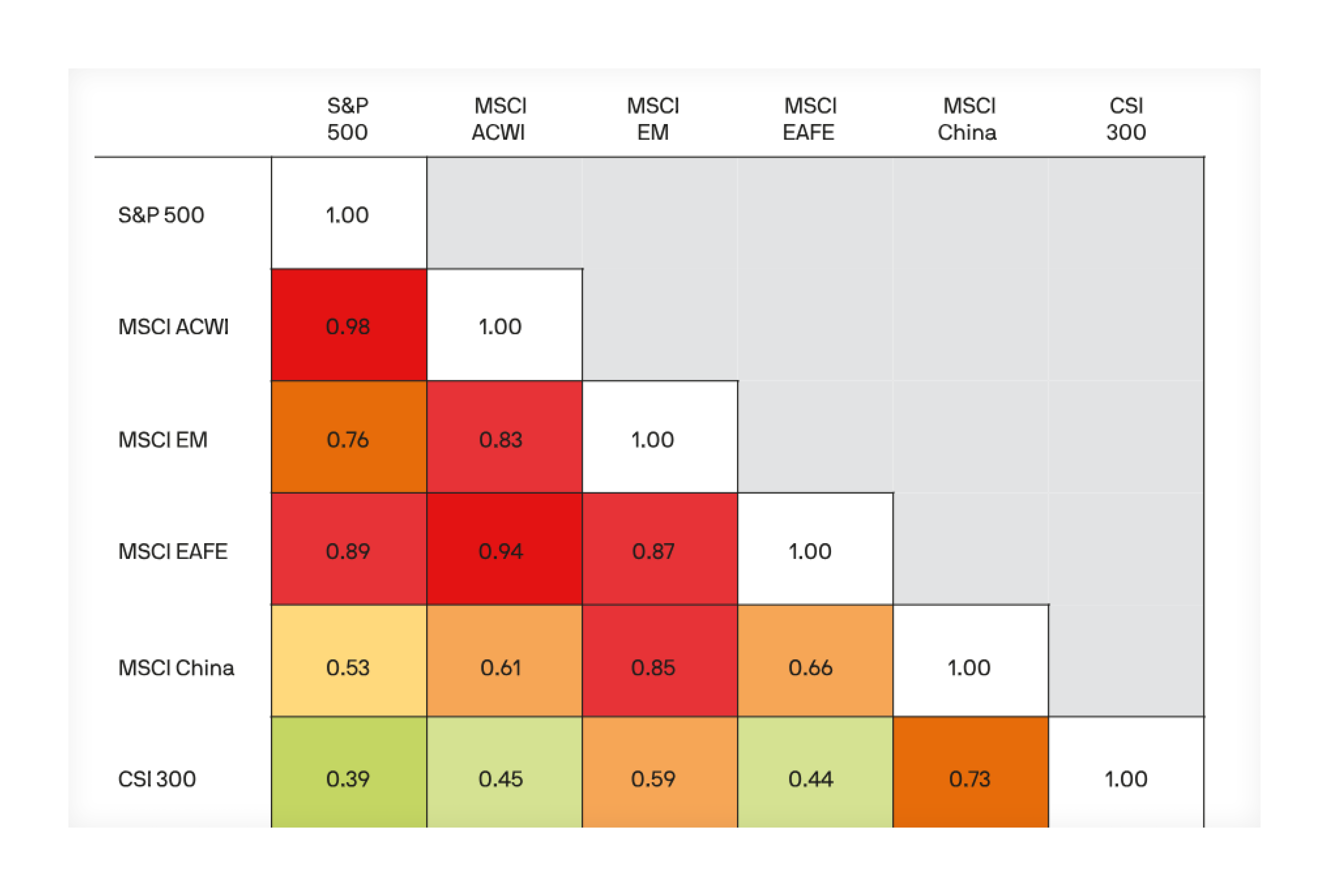
In recent years, A-shares have gained increased prominence globally, particularly with their inclusion in major international indices like MSCI and FTSE Russell. This inclusion has attracted greater foreign capital into the A-Share market as global fund managers seek exposure to China’s rapidly growing economy.
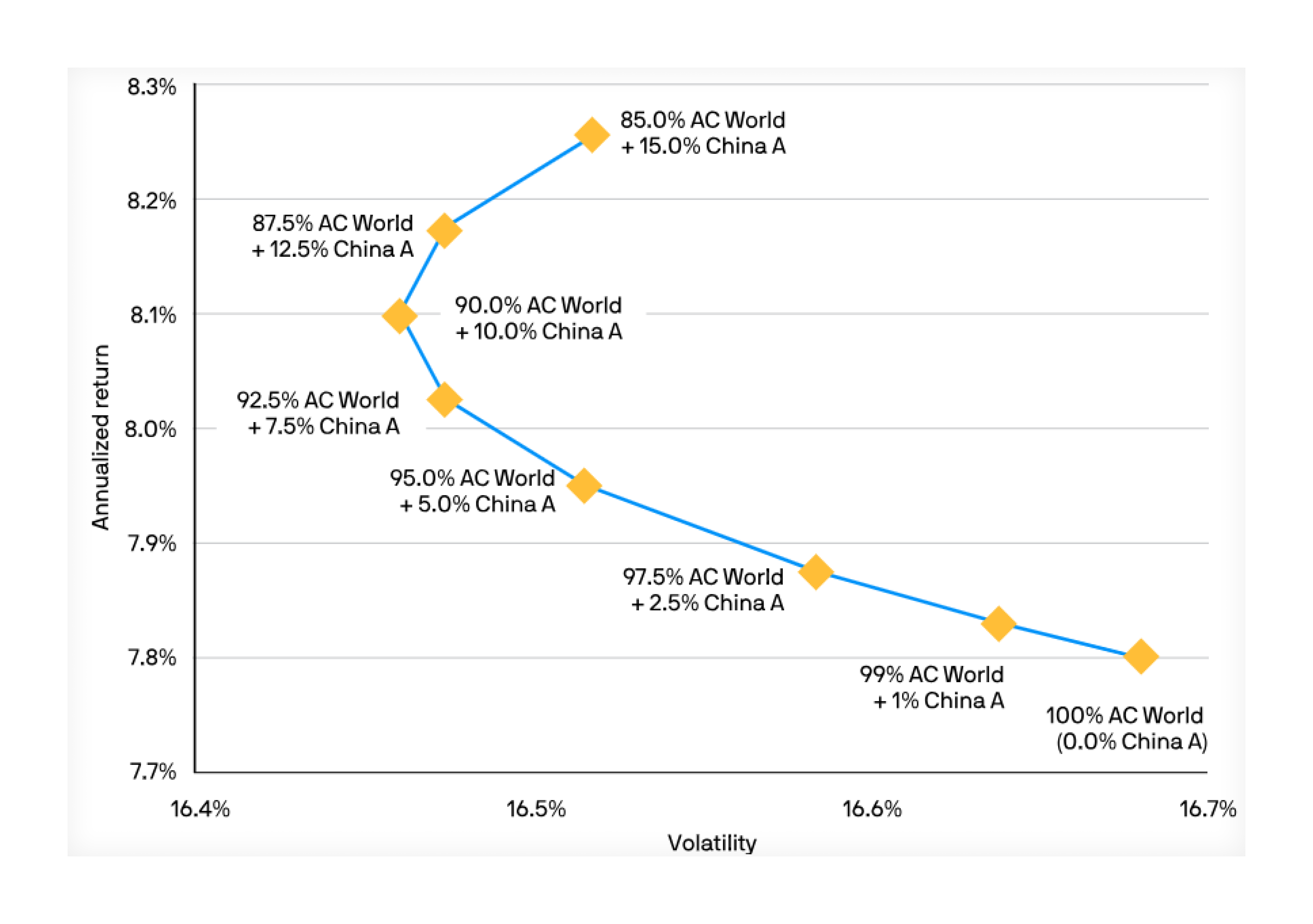
As a result, A-shares are now viewed as an essential part of a diversified portfolio for investors looking to tap into the Chinese market, offering significant investment potential. This growing accessibility and China’s expanding influence on the global economy have further integrated A-shares into the broader international financial ecosystem.
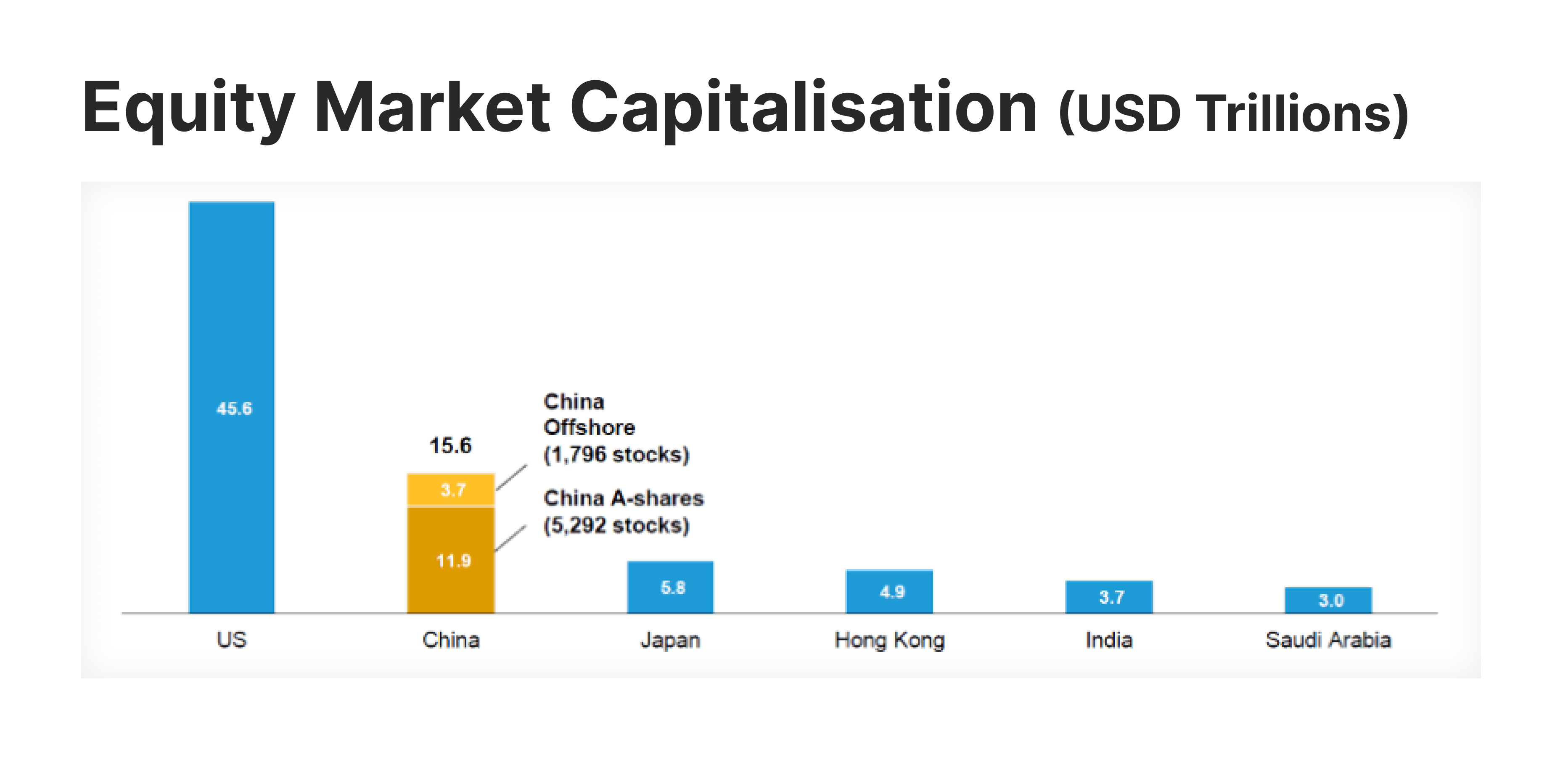
Fast Fact
In addition to H-shares and A-shares, there are also B-shares, which are shares of Chinese companies that are also listed on the SSE and SZSE but traded in foreign currencies.
H-shares are shares of Chinese enterprises registered in mainland China but listed and traded on the Hong Kong Stock Exchange (HKEX). These shares are denominated in Hong Kong dollars (HKD), making them accessible to many international investors. Unlike A-shares, which are traded in mainland China and historically restricted to domestic investors, H-shares are open to foreign and domestic investors without restrictions.
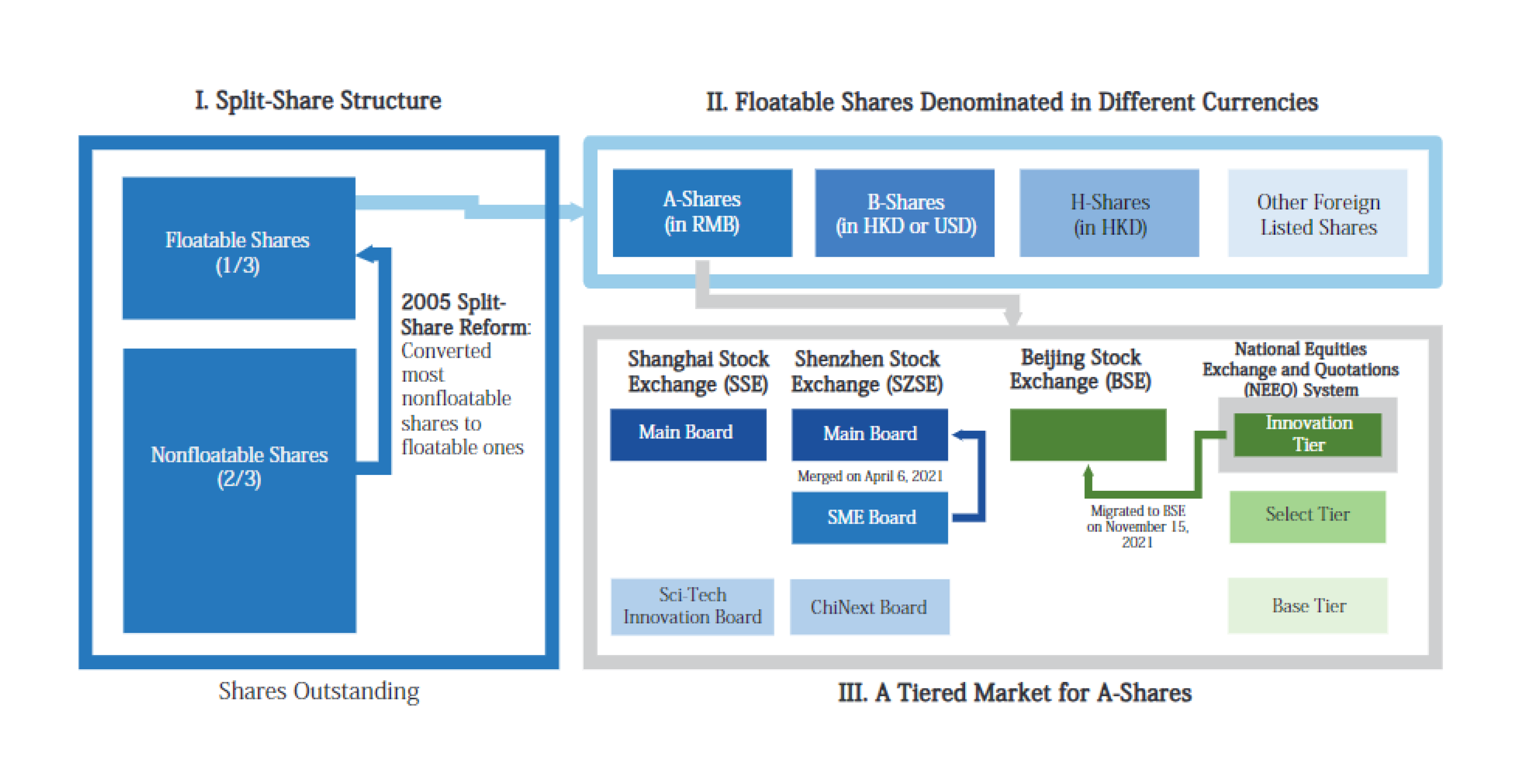
H-shares were created for Chinese companies to raise capital in global markets and gain international exposure. These companies are still subject to Chinese laws and regulations regarding their business operations but must also adhere to the more stringent regulatory and financial reporting standards of Hong Kong's market.
This dual oversight offers greater transparency and makes H-shares attractive to global investors seeking exposure to Chinese businesses without the complexities of mainland market access.
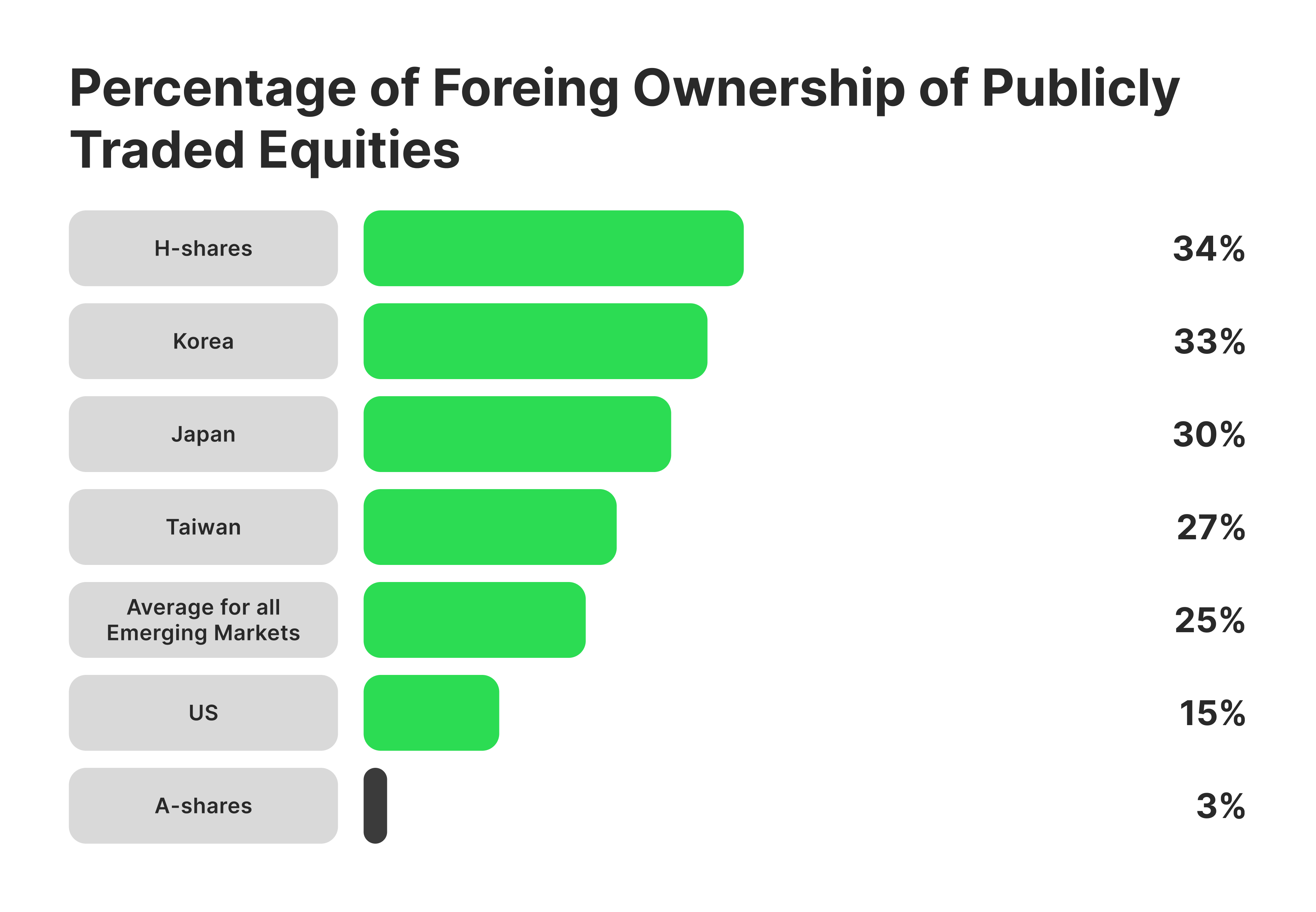
In addition to providing overseas investors with easier access to Chinese firms, H-shares often trade at different valuations compared to their A-Share counterparts due to differences in market dynamics, investor bases, and liquidity between the Hong Kong and mainland markets. This price disparity, known as the A-H share premium, can present arbitrage opportunities for investors who can access both markets.
The liquidity and global visibility of the H-shares index makes them a preferred choice for foreign investors who want exposure to China's growth story while benefiting from the more transparent and globally integrated regulatory framework of Hong Kong. As China continues to open its markets, H-shares are crucial in connecting domestic companies with international capital.
Despite the similar name, H- and A-shares have very clear differences and features of functioning within the framework of Chinese stock exchanges, therefore there are a number of distinctive features that determine the method of investing in them and regulatory standards:
A-shares are traded on the two primary stock exchanges in mainland China: the Shanghai Stock Exchange and the Shenzhen Stock Exchange. The markets for A-shares are largely dominated by domestic investors, and their trading follows the regulations and policies set by the Chinese government and regulatory bodies. Foreign investors' access to these markets has historically been limited but has increased in recent years through various programs.
Traded on the Hong Kong Stock Exchange, H-shares provide international investors easier access to Chinese companies. Hong Kong operates under a separate regulatory framework from mainland China and enjoys a global financial hub status, which increases accessibility and transparency for international participants.
The HKEX allows global investors to trade Chinese company shares in a more familiar and open trading environment than mainland exchanges.
A-shares are denominated in Chinese yuan (CNY), which reflects the domestic economy of China and is subject to the currency's movement and Chinese government policies. For foreign investors, currency exchange risk becomes important when investing in A-shares.
H-shares are denominated in Hong Kong dollars (HKD), a more internationally traded and stable currency than the yuan. As the Hong Kong dollar is pegged to the US dollar, it provides a more stable environment for global investors and reduces some foreign exchange risks that may arise with investing in A-shares.
Historically, A-shares were available only to domestic Chinese investors, meaning foreign investors had no direct access. However, over time, foreign participation has been gradually allowed through programs such as the Qualified Foreign Institutional Investor (QFII), the Renminbi Qualified Foreign Institutional Investor (RQFII), and more recently, the Shanghai-Hong Kong Stock Connect and Shenzhen-Hong Kong Stock Connect programs. These initiatives enable foreign investors to access the A-share market, but their participation is still regulated and subject to certain quotas and restrictions.
H-shares are much more accessible to domestic and international investors without special qualifications or quota systems. H-shares provide a more straightforward way for global investors to gain exposure in Chinese ventures, and they face fewer regulatory hurdles than A-shares.
A-shares are governed by mainland China's financial regulatory bodies, specifically the China Securities Regulatory Commission (CSRC). The regulatory environment in China can be more opaque and subject to government intervention, especially in terms of market access, trading rules, and capital controls.
Regulatory shifts can more immediately impact A-share trading, often creating uncertainty for foreign investors unfamiliar with Chinese regulations.
H-shares are governed by Hong Kong's regulatory framework, which is widely regarded as more transparent and aligned with international standards.
The Hong Kong Securities and Futures Commission (SFC) oversees the market, ensuring compliance with international financial regulations, which provides greater confidence for global investors in transparency, corporate accountability, and enforcing financial reporting requirements.
The A-share market is primarily driven by domestic sentiment, which can be more speculative due to the dominance of retail investors. Domestic policies, economic conditions, and government intervention often influence market sentiment in mainland China, leading to volatility in A-shares. This can create price bubbles or cause sharp corrections based on changes in government policies or economic developments.
H-shares tend to reflect global investor sentiment and macroeconomic factors, as they are influenced by domestic and international market conditions.
Because H-shares are traded in a more globalised market, they are less subject to speculative bubbles and more sensitive to global economic trends, exchange rates, and interest rates. As a result, H-shares' pricing often differs from their A-share counterparts, even when they represent the same underlying company.
A-shares generally have higher liquidity within China, driven by a large base of domestic retail investors participating in the market. The presence of these active investors creates high trading volumes in A-shares. However, this liquidity can sometimes be volatile, influenced by speculation, market trends, and government policies.
While H-shares may have lower liquidity compared to A-shares due to fewer retail participants, they attract a significant amount of global large-cap investors. This can lead to steady and more stable trading volumes, although liquidity may vary depending on global market conditions.
A-shares and H-shares of the same corporation regularly trade at different prices, which creates an A-H share premium. A-shares are frequently more expensive than their H-share counterparts due to various factors, such as market access constraints, currency risk, liquidity, and investor behaviour. In many cases, domestic demand for A-shares drives up prices, whereas H-shares tend to be priced based on global market conditions, creating this price disparity between the two share classes.
Companies listed as A-shares are subject to mainland China's financial reporting and disclosure rules and regulations. While these standards have improved over time, they may still differ from international norms, and transparency can be an issue for foreign investors who are used to stricter reporting standards. This sometimes leads to concerns about corporate governance and financial disclosures.
H-share companies must comply with Hong Kong's stringent financial disclosure and reporting standards, which are aligned with international norms. This results in higher transparency, better corporate governance, and a more robust regulatory environment for global investors.
The higher level of disclosure and accountability often makes H-shares more appealing to investors who prioritise transparency and regulatory compliance.
The difference in valuation between A-shares and China H-shares for the same company creates arbitrage opportunities for investors who can trade in both markets. When A-shares are priced higher than H-shares, arbitrage traders can profit by buying the lower-priced H-shares and selling the higher-priced A-shares, assuming they can access both markets.
However, this arbitrage is limited by capital controls, regulatory restrictions, and the operational complexity of trading across two distinct markets with different currencies and investor bases.
The modern A- and H-shares market has a rather complex structure and regulatory mechanisms and has a strong impact on the Chinese economy. For these reasons, there are certain directions for the development of this category of marketable securities, which are as follows:
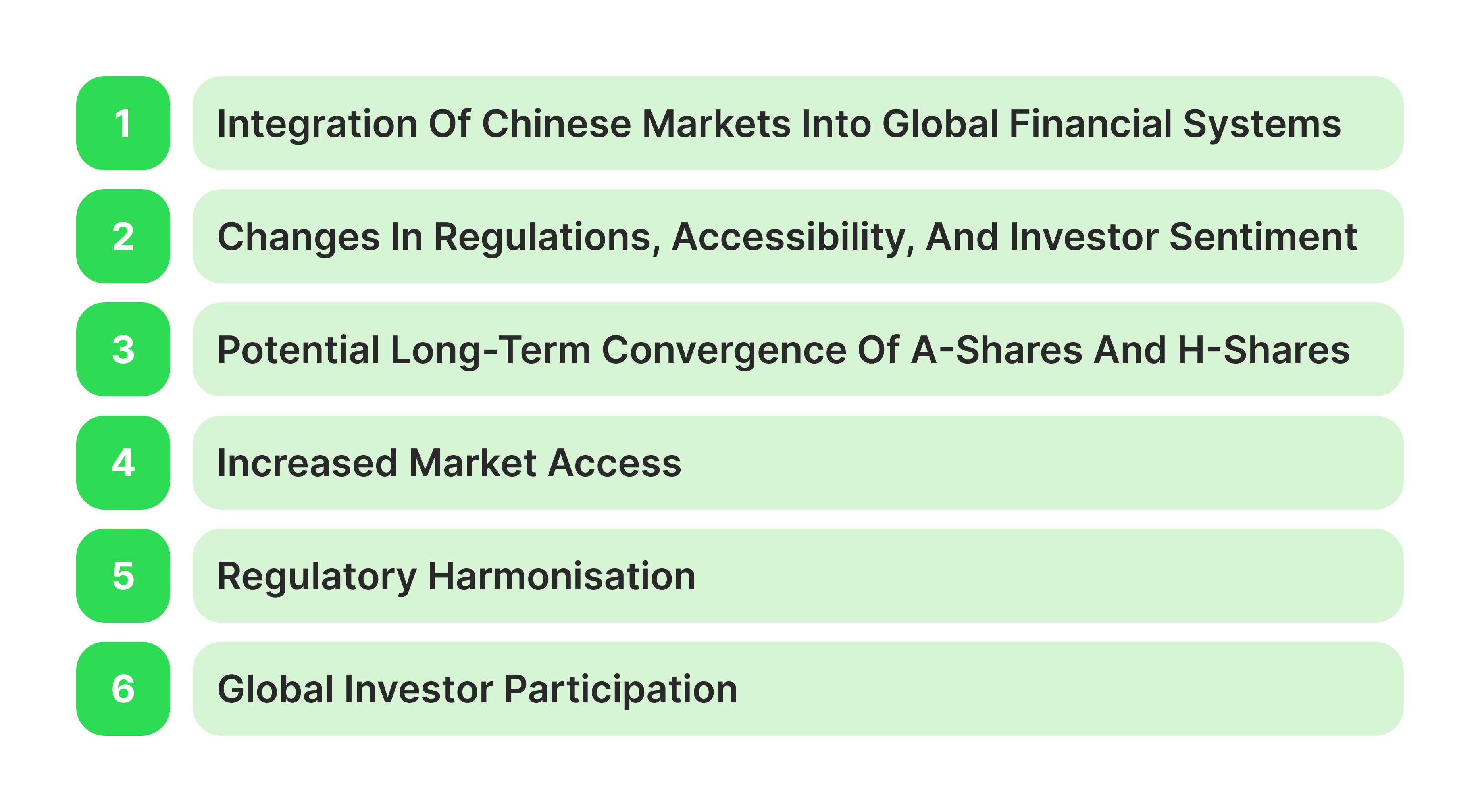
China's financial markets have made significant strides toward integrating with the global economic system in recent years. A key development in this process has been the inclusion of A-shares in major global indices, such as the MSCI Emerging Markets Index and the FTSE Russell Index.
This inclusion has drawn increased interest and investment from global institutional investors, as funds tracking these indices are now required to allocate capital to A-shares. The MSCI inclusion began in 2018 and continues to expand, with A-shares making up a growing portion of global investment portfolios.
As global capital flows into the A-Share market, liquidity and price discovery have improved, helping to narrow the gap between China's domestic markets and international investment practices. This integration has enhanced transparency and governance in listed Chinese firms and has fostered the gradual opening of China's capital markets to foreign investors.
Regulatory changes in both mainland China and Hong Kong have played a major role in increasing international stakeholders' access to A-shares and H-shares. The launch of the Shanghai-Hong Kong Stock Connect in 2014, followed by the Shenzhen-Hong Kong Stock Connect in 2016, has allowed international investors to buy A-shares directly through Hong Kong, bypassing some of the previous regulatory barriers.
These programs have opened China's stock markets to global investors while allowing domestic Chinese investors to access Hong Kong-listed stocks (H-shares).
In addition to improving access, Chinese authorities have worked to modernise the regulatory framework for A-Shares, enhancing corporate governance standards, financial disclosures, and investor protections.
These reforms aim to boost foreign investor confidence and align the market more closely with international standards. As a result, investor sentiment toward Chinese markets has become more positive, particularly as China's economy grows and diversifies.
There is increasing speculation about the potential long-term convergence of A-shares and H-shares. While price differences exist due to market structure, regulatory environments, and investor bases, ongoing efforts to open up China's capital markets may reduce these disparities over time.
This potential convergence presents an intriguing future for the Chinese market, with the possibility of a more unified and integrated investment environment. Several factors could drive this convergence:
As foreign investors gain greater access to the A-Share market through expanded Stock Connect programs and other initiatives, the price disparity between A-shares and H-shares could narrow. Easier cross-border capital flows would enhance price alignment between the two markets.
As China continues to adopt international financial reporting standards and improves regulatory oversight, the corporate governance gap between A-Share and H-Share companies may diminish. This alignment could lead to more consistent pricing between the two share classes.
As Chinese stocks become more integrated into global portfolios through indices like MSCI and FTSE, the influence of global investors on A-shares is expected to increase. This shift could lead to more uniform pricing of A-shares and H-shares as both become part of the broader global financial system.
Understanding the key differences between H-shares and A-shares is essential for investors seeking access to Chinese companies. While H-shares offer easier access for international investors through the Hong Kong Stock Exchange and are traded in Hong Kong dollars, A-shares provide a more direct route into mainland China’s economy, though historically, they have been more restricted in terms of foreign access.
As China’s markets continue to evolve and open up, both H-shares and A-shares will play crucial roles in providing diversified exposure to the world’s second-largest economy. Investors need to assess their investment goals, risk tolerance, and market access when deciding which type of share is best suited for their portfolio.
H-shares are the securities of Chinese enterprises presented on the Hong Kong Stock Exchange and traded in Hong Kong dollars.
A-shares are stocks of companies based in mainland China that are listed on the SSE or the SZSE and traded in the Chinese yuan.
While both H-shares and A-shares represent many of the same business types, H-shares are available for over 300 Chinese enterprises, while A-shares represent a much broader selection of firms, covering thousands of companies listed on the mainland.
Yes, foreign investors can now access A-Shares through specific programs such as the Qualified Foreign Institutional Investor (QFII), the Renminbi Qualified Foreign Institutional Investor (RQFII), and the Stock Connect program.
For foreign-based investors, H-shares are typically easier to access due to their listing on the Hong Kong Stock Exchange, which is more familiar to global investors and has fewer regulatory barriers. A-shares can provide broader entry to the Chinese market but may involve more regulatory and currency-related challenges.